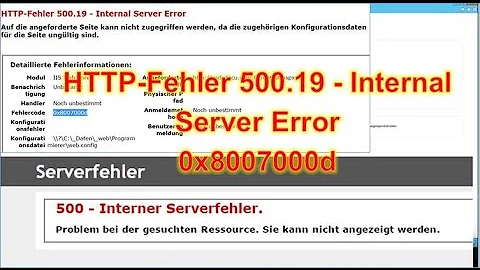Enabling APC causes internal server error
Do you have open_dir restrictions in effect? If this is on user account I would set APC's tmp directory relative to users home directory with proper permissions.
Related videos on Youtube
VicePrez
Updated on September 18, 2022Comments
-
VicePrez over 1 year
After installing and enabling APC 3.1.9 (Alternate PHP Cache), using
pecl, i ran into an internal server error. I checked my error logs, and this is what shows up.Error Logs:
PHP Fatal error: PHP Startup: apc_mmap: mkstemp on /tmp/apc.efdb4d failed: in Unknown on line 0 [Wed Jul 06 23:47:41 2011] [error] mod_fcgid: process /var/www/cgi-bin/cgi_wrapper/cgi_wrapper(22397) exit(communication error), get unexpected signal 11Instead of adding the APC extension to my
php.inifile, i created anapc.inifile in/etc/php.d/, here's my current APC configurationapc.ini configuration:
; /etc/php.d/apc.ini extension = apc.so apc.enabled = 1 apc.shm_segments = 1 apc.shm_size = 128M apc.optimization = 0 apc.num_files_hint = 4096 apc.ttl = 7200 apc.user_ttl = 7200 apc.gc_ttl = 0 apc.cache_by_default = 1 apc.filters = "" apc.mmap_file_mask = "/tmp/apc.XXXXXX" apc.slam_defense = 0 apc.file_update_protection = 2 apc.enable_cli = 0 apc.max_file_size = 10M apc.stat = 1 apc.write_lock = 1 apc.report_autofilter = 0 apc.include_once_override = 0 ;apc.rfc1867 = 0 ;apc.rfc1867_prefix = "upload_" ;apc.rfc1867_name = "APC_UPLOAD_PROGRESS" ;apc.rfc1867_freq = 0 apc.localcache = 0 apc.localcache.size = 512 apc.coredump_unmap = 0 apc.stat_ctime = 0Even after disabling APC, i ran into another error while trying to log in to Plesk CP:
ERROR: Zend_Db_Statement_Exception SQLSTATE[HY000]: General error: 1 Can't create/write to file '/tmp/#sql_6d7_0.MYI' (Errcode: 13)I fixed the above problem by restarting my container through Plesk's Power Panel. I think it had to with changing
/tmptoexecusingmount -o remount,exec /tmpto solve permission errors during the APC installation throughpecl. After the installation was done, I returned/tmpback tonoexec. The gist of these steps can be found here.The first error still remains unsolved.
I'm Currently running on:
- CentOS 5.6
- PHP 5.3.5
- FastCGI
- Installed APC 3.1.9
I'm not sure how to solve this problem. Is it because im using the lastest version of APC? or the
apc.iniconfig? Does it matter where i enabled the apc extension? i.e./etc/php.iniversus/etc/php.d/apc.iniHow about FastCGI and APC compability issues?
Any help or advice would be greatly appreciated.
-
cyberx86 almost 13 yearsThere is no problem with your apc.ini file - I have the exact same setup (CentOS/PHP 5.3.6/FastCGI/APC 3.1.6) and your apc.ini file worked without issue. I might guess that you have a permissions problem on your /tmp directory - try setting it to 0777 to diagnose; if that fixes it, either change the mmap path or narrow down the permissions to something acceptable.
-
VicePrez almost 13 years@cyberx86 Thanks a lot buddy. I ended up solving the problem using your advice. The problem was on multiple fronts. The
apc.inifile was supplemented by w3 total cache's plugin in itsinifolder. It was owned by my ftp user (it wascp-ed directly from there to/etc/php.d/), so i just changed it toroot/root, and the/tmpfolder had restrictive permissions, so i loosened it up a little bit. Answer the question, so i can give you credit. Thanks again. -
cyberx86 almost 13 yearsGive it to @Aleksey Korzun - he has essentially the same thing, just approached differently, and posted it before I did (which is why I didn't post mine as an answer - didn't seem right). Glad it worked out - thanks for thought.
-
VicePrez almost 13 yearsfor sure @cyberx86. by the way, whats considered a secure set of permissions for the
/tmpfolder, and what would be an alternative to it? -
cyberx86 almost 13 yearsIdeally if you can avoid execution permissions that is a good. Usually tmp is owned by root - and you will have other 'users' writing there - which means at least 0666 is common. Most linux distros have 0777 drwxrwxrwt (t=only user can delete). Make it as tight as possible - if you don't have any users writing to tmp, try a 0664 or even a 0644, but I don't think most things will work with those.
-
VicePrez almost 13 yearsthanks @cyberx86. I'll look into it more and see what I can get away with. I cant believe how much of an impact opcode caching has on a website. Onload times are reduced 50-70%.
-
cyberx86 almost 13 yearsDepending on the type of site, a disk cache can be even more effective - either generating and serving static pages, or using a caching proxy (e.g. nginx's proxy_cache or squid); you may also consider looking into memcached. (And of course, check out the apc.php file that shows which pages get the most caching, etc - potentially useful).
-
VicePrez almost 13 yearsthanks for looking out. pretty much what @cyberx86 stated.
-
Aleksey Korzun almost 13 yearsDamn it @cyberx86! :)




